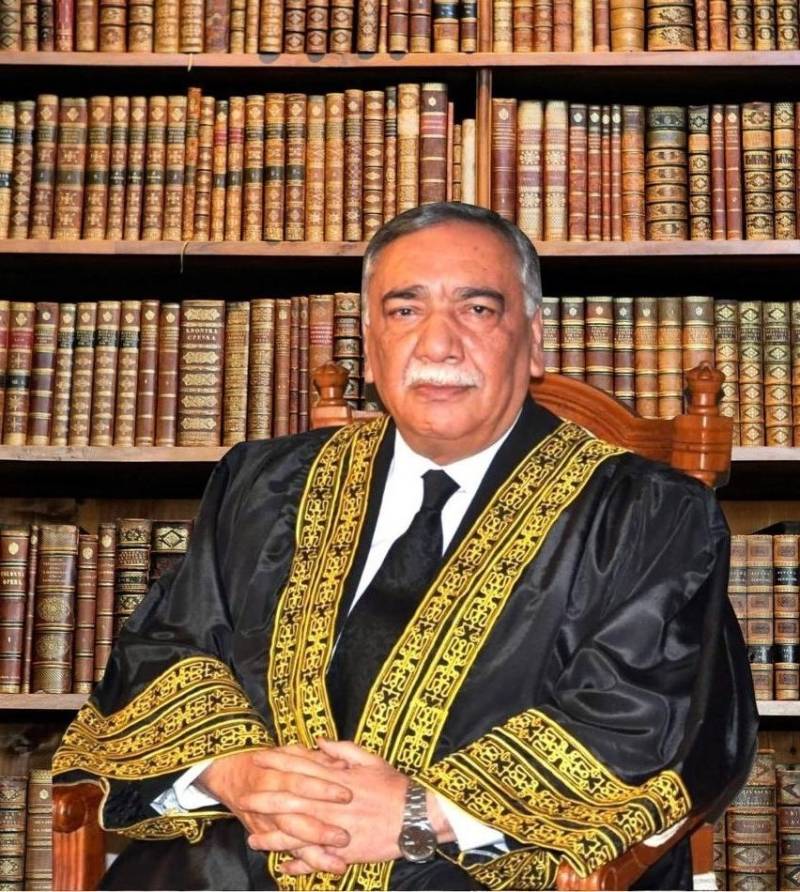
The chief justice stated that Prime Minister Imran Khan’s criticism of the judiciary is baseless because the judges had disqualified a PM (Yousaf Raza Gilani) and punished another (Nawaz Sharif).But were those judgements worth celebrating? Hassan Zaman discusses.
Chief Justice Asif Saeed Khosa recently responded to Prime Minister Imran Khan’s statement and said that the judiciary is performing its functions in accordance with the law and even the powerful are held accountable. Imran Khan had earlier criticized the justice system, lamenting that the people of Pakistan are losing trust in it.
Such a scathing rejoinder from the chief justice is not an ordinary development. Chief Justice Khosa had vowed to resolve pending cases and deliver speedy justice when he assumed office. And in his speeches, he has expressed this desire many times. He set up model courts which have disposed of a number of cases in a short span of time. Given his commitment to delivering justice to the downtrodden, it was expected that he would strongly react to the prime minister’s criticism of the judiciary. And he did.
The chief justice is well within his right to comment on the recent judgements by the Supreme Court and use them to prove his point about the judiciary being unbiased. Having said that, there is one part of his statement which I strongly disagree with.
The chief justice stated that Prime Minister Imran Khan’s criticism of the judiciary is baseless because the judges had disqualified a PM (Yousaf Raza Gilani) and punished another (Nawaz Sharif).
Much has been said on how the Supreme Court verdict disqualifying Nawaz Sharif was legally flawed. The decision was based on Articles 62 and 63 –which are a controversial part of our constitution, and therefore the grounds for disqualification were vague. Furthermore, his failure to declare the United Arab Emirates (UAE) company FZE Capital’s income in his nomination papers was not a legal basis to dismiss Nawaz Sharif. The judgement held no legal ground for disqualification.
Yousaf Raza Gilani’s disqualification over contempt of court for not writing a letter to the Swiss authorities to re-open then president Asif Ali Zardari’s corruption cases is another example of travesty of justice. An elected prime minister was sent packing because he refused to write letter to the Swiss authorities citing the ‘immunity’ that law had granted to Asif Zardari as president.
His stance was vindicated when in August 2018, National Accountability Bureau (NAB) told Supreme Court that Swiss cases cannot be reopened because they are ‘time-barred’. Yousuf Raza Gilani was disqualified on a flimsy ground, and so was Nawaz Sharif. So these two judgements of the apex court cannot be termed as an achievement and in no way prove the courts are unbiased. For this, the courts will have to move beyond punishing politicians and hold former judges and generals accountable who are also accused of misdoings, but somehow manage to get a clean chit.
Chief Justice Asif Saeed Khosa recently responded to Prime Minister Imran Khan’s statement and said that the judiciary is performing its functions in accordance with the law and even the powerful are held accountable. Imran Khan had earlier criticized the justice system, lamenting that the people of Pakistan are losing trust in it.
Such a scathing rejoinder from the chief justice is not an ordinary development. Chief Justice Khosa had vowed to resolve pending cases and deliver speedy justice when he assumed office. And in his speeches, he has expressed this desire many times. He set up model courts which have disposed of a number of cases in a short span of time. Given his commitment to delivering justice to the downtrodden, it was expected that he would strongly react to the prime minister’s criticism of the judiciary. And he did.
The chief justice is well within his right to comment on the recent judgements by the Supreme Court and use them to prove his point about the judiciary being unbiased. Having said that, there is one part of his statement which I strongly disagree with.
The chief justice stated that Prime Minister Imran Khan’s criticism of the judiciary is baseless because the judges had disqualified a PM (Yousaf Raza Gilani) and punished another (Nawaz Sharif).
Much has been said on how the Supreme Court verdict disqualifying Nawaz Sharif was legally flawed. The decision was based on Articles 62 and 63 –which are a controversial part of our constitution, and therefore the grounds for disqualification were vague. Furthermore, his failure to declare the United Arab Emirates (UAE) company FZE Capital’s income in his nomination papers was not a legal basis to dismiss Nawaz Sharif. The judgement held no legal ground for disqualification.
Yousaf Raza Gilani’s disqualification over contempt of court for not writing a letter to the Swiss authorities to re-open then president Asif Ali Zardari’s corruption cases is another example of travesty of justice. An elected prime minister was sent packing because he refused to write letter to the Swiss authorities citing the ‘immunity’ that law had granted to Asif Zardari as president.
His stance was vindicated when in August 2018, National Accountability Bureau (NAB) told Supreme Court that Swiss cases cannot be reopened because they are ‘time-barred’. Yousuf Raza Gilani was disqualified on a flimsy ground, and so was Nawaz Sharif. So these two judgements of the apex court cannot be termed as an achievement and in no way prove the courts are unbiased. For this, the courts will have to move beyond punishing politicians and hold former judges and generals accountable who are also accused of misdoings, but somehow manage to get a clean chit.
